
The Rijksmuseum is the national museum of the Netherlands dedicated to Dutch arts and history and is located in Amsterdam. The museum is located at the Museum Square in the borough of Amsterdam South, close to the Van Gogh Museum, the Stedelijk Museum Amsterdam, and the Concertgebouw.
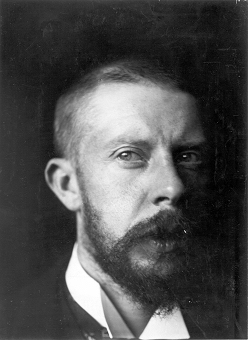
George Hendrik Breitner was a Dutch painter and photographer. An important figure in Amsterdam Impressionism, he is noted especially for his paintings of street scenes and harbours in a realistic style. He painted en plein air, and became interested in photography as a means of documenting street life and atmospheric effects – rainy weather in particular – as reference materials for his paintings.
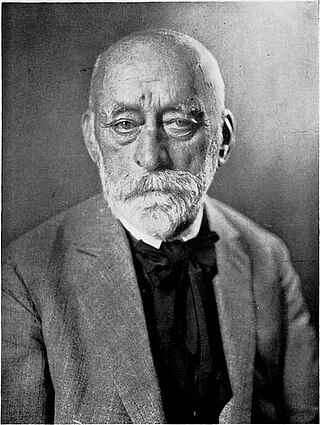
Hendrik Petrus Berlage was a Dutch architect and designer. He is considered one of the fathers of the architecture of the Amsterdam School.

Leiden University Libraries is a library founded in 1575 in Leiden, Netherlands. It is regarded as a significant place in the development of European culture: it is a part of a small number of cultural centres that gave direction to the development and spread of knowledge during the Enlightenment. This was due particularly to the simultaneous presence of a unique collection of exceptional sources and scholars. Holdings include approximately 5,200,000 volumes, 1,000,000 e-books, 70,000 e-journals, 2,000 current paper journals, 60,000 Oriental and Western manuscripts, 500,000 letters, 100,000 maps, 100,000 prints, 12,000 drawings and 300,000 photographs. The library manages the largest collections worldwide on Indonesia and the Caribbean. Furthermore, Leiden University Libraries is the only heritage organization in The Netherlands with three registrations of documents in UNESCO's Memory of the World Register.

Jan Lievens was a Dutch Golden Age painter who was associated with his close contemporary Rembrandt, a year older, in the early parts of their careers. They shared a birthplace in Leiden, training with Pieter Lastman in Amsterdam, where they shared a studio for about five years until 1631. Like Rembrandt he painted both portraits and history paintings, but unlike him Lievens' career took him away from Amsterdam to London, Antwerp, The Hague and Berlin.

Rembrandt Harmenszoon van Rijn, usually simply known as Rembrandt, was a Dutch Golden Age painter, printmaker and draughtsman. An innovative and prolific master in three media, he is generally considered one of the greatest visual artists in the history of art and the most important in Dutch art history. It is estimated Rembrandt produced a total of about three hundred paintings, three hundred etchings and two thousand drawings.

Aert de Gelder was a Dutch painter. He was the only Dutch artist to paint in the tradition of Rembrandt's late style into the 18th century.
Ernst van de Wetering was a Dutch art historian and an expert on Rembrandt and his work.
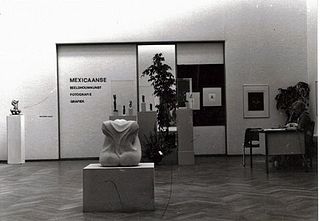
Pulchri Studio is a Dutch art society, art institution and art studio based in The Hague ('s-Gravenhage), Netherlands.

Cornelis Hofstede de Groot, was a Dutch art collector, art historian and museum curator.
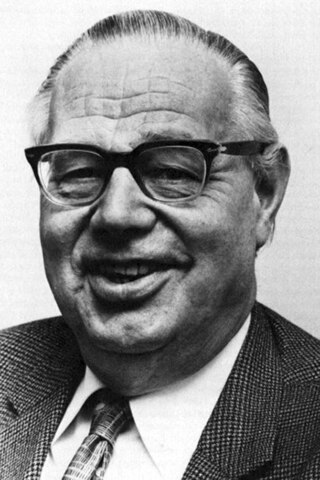
Jan Gerrit van Gelder was a Dutch art historian.

Jan Hillebrand Wijsmuller was a Dutch painter. He belongs to The 2. Golden Age of Dutch Painting.
The following is a timeline of the history of the municipality of The Hague, Netherlands,

Isabella Henriette van Eeghen, usually cited as I. H. van Eeghen, was a Dutch historian who worked for the Stadsarchief Amsterdam.
Gary Schwartz is an American-born Dutch art historian, who is a scholar of Rembrandt and art of the Dutch Golden Age.

Jhr. Johannes Cornelis de Jonge was a Dutch Rijksarchivaris, historian, and politician. He is best known for his encyclopedic Geschiedenis van het Nederlandsche Zeewezen, a naval history of the Netherlands that was based on the Dutch naval archives, a large part of which were destroyed in a fire in the archives of the Dutch Department of the Navy in 1844. By default therefore this history had to come in the place of the lost primary documents.

The Medusa class was a class of two steam corvettes with auxiliary power of the Royal Netherlands Navy. The class comprised Medusa, the first Dutch warship with screw propulsion, and Prinses Amelia.

Passing Mother's Grave or Langs Moeders Graf also known as Passing the Churchyard is an oil painting on canvas made in 1856 by the Dutch Realist artist and a representative of the Hague School of painters Jozef Israëls. The subject of the painting is a widowed fisherman walking past his deceased wife's grave with his two children.
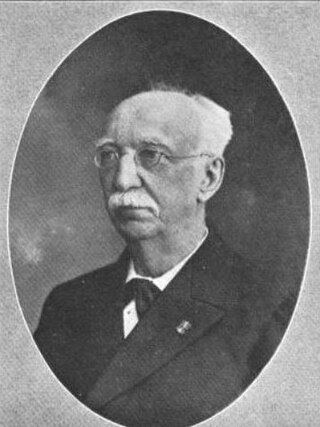
Pieter Hendrik van der Kemp was a Dutch colonial civil servant and a Dutch historian, specializing in the history of the Dutch East Indies.
















